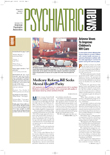A team of researchers at Georgetown University has established a registry to collect data on patients who suffer potentially fatal heart rhythms caused by medications, including psychotropic drugs. The team hopes to develop a “genetic blueprint” used to screen individuals for increased risk prior to prescribing drugs known to increase the risk of sudden cardiac death.
“Drugs in many classes are capable of inducing an arrhythmia,” said Michael Kilborn, M.D., Ph.D, a fellow in the department of cardiology at Georgetown. “The drugs with the highest chance of causing these arrhythmias are antiarrhythmics, paradoxically. Probably the second riskiest group is antipsychotics.”
A great deal has been known about particular medications’ potential to cause fatal arrhythmias; however, little has been known about the actual incidence of the arrhythmias associated with these drugs. Kilborn said the registry will help solve the question of whether the theory holds up in clinical experience.
The reason that so many different types of drugs can lead to potentially fatal arrhythmias, Kilborn explained, is that they affect one type of the potassium channels that control the movement of electrolytes in heart muscle cells, resulting in a lengthening of a particular part of the heart’s electrical cycle known as the QT interval. This is true of tricyclic antidepressants, both the typical and atypical antipsychotics, and some of the SSRIs.
Georgetown’s Center for Education and Research on Therapeutics has established a Web site for the registry, which lists those medications known to cause the potentially fatal heart rhythm associated with QT prolongation, torsades de pointes (
see box). The list links to PubMed that automatically searches for any literature associated with a specific drug and the incidence of torsades de pointes.
The mission of the registry is to collect data from physicians on patients whom they suspect have developed arrhythmias due to a drug or drug combination. It will collect data on the prevalence of drug-induced prolongation of the QT interval, review electrocardiograms on patients who have experienced an arrhythmia, and obtain a buccal smear.
The registry’s long-term goals are to characterize patients at risk of torsades de pointes with specific drugs and to develop a DNA test that would rapidly predict individuals at risk of developing drug-induced arrhythmias, prior to prescribing a medication that could increase their risk.
Physicians who contribute patient data to the registry (which may be done through a secure link on the Web site) receive a quarterly newsletter, telephone consultation on their cases, regularly updated reference cards on prolonged QT syndrome and drug interactions, and automated, anonymous reporting of cases to the FDA’s MedWatch program.
To date, according to the registry, more than 40 marketed drugs have been found to block potassium channels in the heart, leading to a prolonged QT interval and inducing, in susceptible individuals, torsades de pointes.
More information about drug-induced QT prolongation and access to the registry is available at www.torsades.org and www.qtdrug.org. ▪
